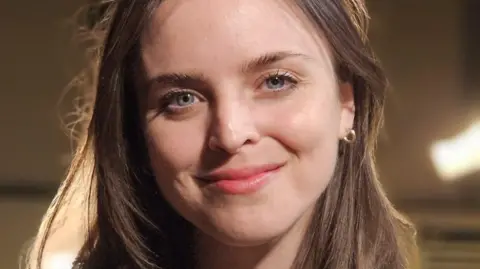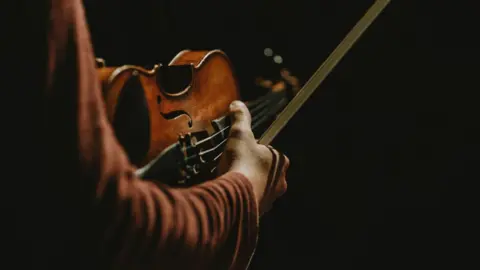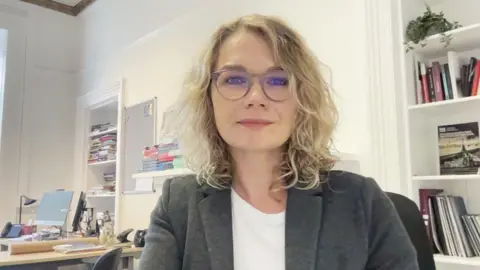It's scary to talk about music scene abuse - but if I don't, it won't change
 BBC
BBCA Scottish folk music musician has told BBC News that she is scared to speak out about sexual abuse in her industry - but that if she doesn't, nothing will change.
Laura Jane Wilkie, a fiddler from Tain in the Highlands, has been part of the traditional music scene for more than 17 years.
She has seen an improvement in behaviour in that time but believes it could be better.
"I've had some negative experiences since I was about 15. The accumulation of events and experiences of myself and other people, or things that I see, are really troubling," she said.
"There are some terrible things that happen and when people take account for what they have done, apologise and mean it, that's great.
"But that doesn't always happen and that is where the issue is. And obviously there should be accountability for that."
 Getty Images
Getty ImagesLaura Jane was speaking out as researchers at Glasgow University launched a study into sexual abuse in the Scottish folk music scene.
They are inviting women aged 18 years or over, who are or were involved in the Scottish folk music scene, to participate.
A team of academics will record people's experiences and create an independent evidence base in a bid to find solutions to an ongoing issue.
Funded by the university, a final report will be published by the Scottish Centre for Crime and Justice Research.
For Laura Jane, it can be difficult to go into the details of those experiences.
She said: "I think a lot of us who have been through these experiences, we talk about it a lot and sometimes the report becomes more about the incidents themselves. It's important to be aware of those things but I think it is more important that we move"
'MeToo moment'
At the centre of the issue is music's informal environment. Musicians of all ages mix in social settings and alcohol is often to the fore.
If someone is made to feel uncomfortable or worse, there is no HR department to turn to.
Women started to tell their stories publicly in 2020, calling for an end to "inappropriate behaviour" and sexism in trad music.
The following year, well-known musician Iona Fyfe said she was offered help to get a festival gig in return for sex.
At the time, the Musicians' Union saw it as a "MeToo" moment for the industry, saying that men had "always wielded the power in the trad music scene" and that the imbalance of power was "quite off" in music.

Dr Kelly Johnson, one of the three researchers, told BBC Scotland News: "There has been a lot of discussion in public forums about the challenges women musicians are facing in terms of sexualised harassment and violence in the Scottish folk scene.
"But we are conscious there is not much research addressing this issue at all.
"We are launching an online confidential survey to capture the extent and nature of women musician's experience of sexual violence and harassment and collect ideas and understandings about pathways for change and possible routes forward."
She said it was important to gather evidence because often when one person speaks out, it is easily negated by someone else saying that it isn't their experience and it doesn't matter.
She added: "We are external to the folk music scene and us collecting independent evidence that is separate from the music scene itself will hopefully create a space for that conversation about what is going on and how it can move forward."
'A blurry line'
Laura Jane sees this study as a step forward and is hopeful that it could lead to the establishment of an HR style framework.
She said: "I think that sort of framework which would include – I hope – education for all genders on how to conduct ourselves in the many facets of being a freelance musician in Scotland.
"It's not just playing, performing or rehearsing, it's when you start learning from teachers – you are almost peers at that point.
"That can be a blurry line if people in the class and people teaching the class are over 18."
Dr Johnson acknowledges the difficulty in coming forward. Speaking up could lead to a loss of work for these women.
"We understand it is a difficult discussion to speak up. The folk scene is a really important part of our cultural identity, and is fragile in some respects, often involving tight-knit communities. Equally it is important that the scene is accessible and safe for people who want to participate in it."
But it was important for Laura Jane to have her say - to be a voice for other women and to try and make a community that is so important to so many, a safer place for them.
"I think it's important we keep this conversation open and that is the only way things can change and get better. If we are openly talking about this, then hopefully we can learn and understand each other better. If it even prevents one other person from experiencing something bad in the traditional music scene or any music scene then I think I have a responsibility to allow that."
If you or anyone you know has been affected by the issues in this article, help is available at BBC Action Line.
